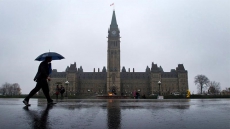OTTAWA — The auditor general says the federal government can't tell if northerners are reaping the full benefit of a program aimed at helping to offset the high cost of food in the North.
Michael Ferguson's latest report says Aboriginal Affairs and Northern Development Canada doesn't know if local retailers are passing on Nutrition North program subsidies to consumers as required, or are instead pocketing some of the savings themselves.
"It's just simply a case of the information's not there, the department isn't tracking the information, so it's not possible to know whether the full amount of the subsidy is in fact being passed on," Ferguson said at a news conference following the report's release.
The auditors also had problems with the fact that the department doesn't collect reliable data on the profit margins of retailers in order to determine whether consumers are benefiting from the full subsidy.
The report calls that a "missed opportunity" to ensure the program is transparent and to ease some long-standing public skepticism about the program's effectiveness and efficiency.
The northern food-subsidy program, which has an annual budget of $60 million, replaced the old food mail program in 2011. Nutrition North bases its subsidy rates on the remoteness of the communities it serves.
Some places, such as the isolated Nunavut community of Grise Ford, qualify for the full $16-a-kilogram subsidy. Other, less remote communities get subsidies as low as five cents a kilogram.
But Ferguson's team found problems with the way Aboriginal Affairs and Northern Development determined how much each community is subsidized.
The auditors zeroed in on two remote communities in northern Ontario, both about the same distance to the nearest town and lacking year-round road access. One is eligible for a subsidy of $1.60 a kilogram; the other only five cents a kilogram.
"Aboriginal Affairs and Northern Development Canada has not managed the program to meet its objective of making healthy food more accessible to residents of isolated northern communities as it has not identified eligible communities on the basis of need," the report said.
The department told Ferguson's team it has looked at expanding the full subsidy to around 50 fly-in northern communities, but doing so would increase the cost of the program by $7 million a year.
The department is already struggling to pay for the program. Aboriginal Affairs expected a shortfall of $8.2 million for Nutrition North in the 2013-14 fiscal year. Officials told auditors that money meant for other programs or services within the department was used to pay for Nutrition North — which the report calls "the least preferred option in the cost-containment strategy."
Moving money meant for one program to pay for another is nothing new for Aboriginal Affairs. The department shifted half a billion dollars meant for infrastructure over a six-year period to try to cover shortfalls in education and social programs.
Aboriginal Affairs Minister Bernard Valcourt sought to put a positive spin on the auditor's findings.
"Let's be fair to the auditor general. What he says is that we cannot give the assurance that all of the subsidy actually goes to consumers. That's what he says," Valcourt said.
"Because we have data that has been collected by a third party, which shows clearly that the basket of food has gone down by $110 a month for a family of four and that perishable goods have increased by close to 25 per cent.
"What we are unable to say, however, clearly and without doubt, is that all of the subsidy has gone to the consumers."
Retailers and shippers will have to report their past and present profit margins by next April, the minister added.
The government's handling of the Nutrition North program drew criticism from the opposition.
"It's damning," Liberal MP Carolyn Bennett said in an interview. "It completely confirms what the people of the North have been telling us."
Added NDP MP Dennis Bevington: "The program is not lowering costs for northerners and it is not targeting all the communities in need."
The Conservative government has defended the program, saying it has given more people in isolated and remote communities access to healthy and perishable foods.
But the auditors found some decidedly unhealthy foods are being subsidized. Ice cream, bacon and processed cheese spread qualify for the lower of the program's two subsidy levels.
Other foods that used to be subsidized under the food mail program, such as canned goods and rice, have been dropped.
The Conservative government, which is made aware of the contents of auditor's reports in advance and given the opportunity to respond before they are released publicly, announced last week it would spend another $11.3 million on the program over the next year.





